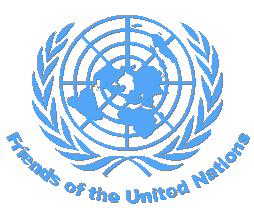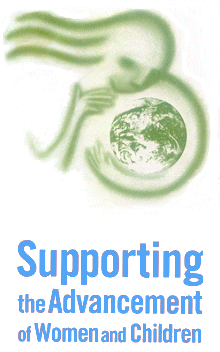
Highlights of UN ConferencesIntroduction by Hillary Clinton
For 50 years, the United Nations has been a leading force in bringing together people of every race, religion, and nationality and in improving the lives of women and children around the globe.
Today, the United Nations continues to focus attention on issues that matter most in the lives of women and their families: Access to education, health care, jobs and credit, and the chance to live in a safe and healthy environment, to enjoy basic legal and human rights, to participate fully in the political life of their countries, and to live in peace.
I had the privilege to witness firsthand the UN's commitment to the world's women at two UN-sponsored meetings: the Fourth World Conference on Women in Beijing and the World Summit For Social Development in Copenhagen. Both experiences illustrated the UN's potential to help hundreds of millions of women and children to become healthy, happy and productive members of society.
The United Nations does more that just organize conferences. Through various agencies such as UNICEF, the World Health Organization, and the United Nations Development Programme, it is at work everyday teaching parents better ways of caring for their children, | 
immunizing babies, and encouraging families to send and keep their daughters in school.
The United Nations commitment to the advancement of women has deepened and broadened over the last twenty years as more and more women take an active interest in UN activities. Women, both as official representatives of their governments and representatives of private organizations, have increasingly become the driving force behind world conferences on social issues.
We know that investments in people, particularly women and children, are just as essential to the prosperity and stability of our global community as investments in open markets and trade. If women are healthy and educated, if they have a chance to work and earn as full and equal partners in society, their families will flourish. And when families flourish, communities and nations flourish.
I encourage your participation in the most important work of the United Nations.
|
Click below to learn conference details
 World Conference on Human Rights World Conference on Human Rights
 International Conference on Population and Development International Conference on Population and Development
 World Summit for Social Development World Summit for Social Development
 Fourth World Conference on Women Fourth World Conference on Women
 Second United Nations Conference on Human Settlements Second United Nations Conference on Human Settlements
 World Summit for Children World Summit for Children
 Conference on Environment and Development Conference on Environment and Development
|
World Conference on Human Rights
 Vienna 1993 Vienna 1993
The role of the UN has greatly increased in promoting and protecting human right - it acts as a global conscience, lawmaker, conducts fact finding missions and functions as a forum of appeal. The Vienna Declaration and Programme of Action adopted at the conference reaffirmed that the human rights of womer are inalienable, integral and indivisable part of universal human rights. It also recognized that systematic violence against women (including rape) in situations of war or armed conflict as a violation of their human rights. Historic steps have been taken:
- Following the Conference's recommendation, thje UN appointed a special Rapporteur on Violence against Women in 1994.
- Pakistan established all women police stations, an ezperiment which has already met with success in Brazil, Columbia, Uruguay and Peru. As a result, reports of crimes against women in these countries have increased substantually.
- Universal ratification of the Convention on the Rights of the Child called for at the Vienna conference, is nearly complete. This treaty sets comprehensive standards for ensuring children's health, education, social development, personal freedom and protection from abuse including child labor and sexual exploitation.
|
International Conference on Population and Development
 Cairo 1994 Cairo 1994
The Conference adopted a landmark document--the ICPD Programme of Action --that made women's empowerment its cornerstone. Delegates recognized that when women have greater control over their own lives, they tend to have smaller, healthier, and better-educated families. The Programme of Action rejects any form of coercion in family planning and population programs and calls for investments in education for girls, greater efforts to reduce child mortality, and expanded access to reproductive health care services, including family planning.
- Increasingly, countries are targetting their development programs toward investments in women and girls.
- Currently, more than half of married women in the developing world use modern contraception.
- Women in developing countries are having fewer children -from 6 births per woman in the 1960's to 3.4 today.

|
World Summit for Social Development
 Copenhagen 1995 Copenhagen 1995
This summit called world attention to the pivotal role women play in development and focused on the urgent need to address poverty, unemployment, Social eclusion and discriminatory practices that prevent women's full
participation in society. Governments adopted the ground-breaking Copenhagen Declaration and Programme of Action which reached a new consensus on the need to put people at the center or development.
- UNDP 1995 annual report that year centered on women and underscored their role in successful sustainable development.
- In many Nordic countries, women have achieved near-equal access to economic and political opportunities.
- More than 1/3 of the labor force in Latin America and Caribbean countries is currently female.

|
Fourth World Conference on Women
 Beijing 1995 Beijing 1995
This international conference was the largest of its kind to address issues affecting women and the girls. Delegates from more than 180 countries reached consensus on critical areas of concern in the Beijing Declaration and Draft Platform for Action. The Platform considered a broad range of topics including the increased feminization of poverty, inequality in access to health care, education and economic opportunities, violence against women (including in armed conflicts), women's political participation, women's roles in safeguarding the environment and the promotion of the human rights of women and girls.
- The President of the United States established an InterAgency Council to coordinate federal implementation of the platforms to develop new initiatives and policies and conduct public education and outreach.
- With UNICEF backing, an increasing number of countries are sensitizing government staff to gender awareness in planning and policy making.
- The Secretary General has established a high level post in his office to integrate a gender perspective in policies and programs throughout the entire United Nations system.
|
Second United Nations Conference on Human Settlements
 Istanbul 1996 Istanbul 1996
One hundred amd seventy-one governments represented in Istanbul committed themselves to work for:
- Adequate shelter for all, by increasing the supply of affordable housing, promoting access for all to safe drinking water and sanitation, and supporting basic services and facilities for the homeless.
- Sustainable human settlements, fostering economic, social and environmental development in an interdependent way and using a "balance-sheet" approach to urban planning-assessing the outcomes of decisions as they affect various sectors of the community and future generations.
- Legislative and administrative reforms to give women full and equal access to economic resources, including the right to inheritance and to ownership of land and other property, credit, national resources and appropriate technology.
|
World Summit for Children
 New York 1990 New York 1990
The World Declaration on the Survival, Protection and Development of Children resulting from the conference set goals for reducing deaths, malnutrition, preventable disease and illiteracy among the children of the developing world and emphasized that girls must be given equal treatment from birth. Five years later, nations are on track to achieve a majority of these goals.
- Malnutrition has been reduced.
- Immunization levels are being maintained or increased measles deaths are down by 80% compared to preimmunization levels.
- Large areas of the developing world have become free of polio and other preventable diseases. Rotary and Kiwanis clubs have raised millions of dollars to provide vaccines and medicine for UN Programs.
|
Conference on Environment and Development
 Earth Summit - Rio de Janero 1992 Earth Summit - Rio de Janero 1992
This conference recognized the crucial role of women must play in sustainable development and in environmental protection. The Plan of Action for Sustainable Development, Agenda 21, called for the involvement of women in the management and protection of natural resource, removing legal, constitutional and cultural obstacles to women's full participation in public life, the establishment of mechanisms to assess the impact of development and environment programs on women and the elimination of female illiteracy.
Considerable progress has been made:
- In developing countries, females have advanced twice as fast as males in literacy and school enrollment.
- By mid-1995, 75 countries had established national sustainable development commissions or coordinating bodies to continue the work begun at UNCED.
- The Global Environment Facility was established to help developing countries finance efforts to protect their biodiversity, prevent climate change, and curb both pollution of international waters and the depletion of the ozone layer.
|
Home |
General Info |
Newsletter |
Tolerance Education |
Links |
Projects |
Peacemaker Corps |

|